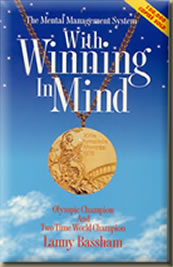
Lanny Bassham trained five hours a day, five days a week for ten years before making the 1972 Olympic Team as a rifle shooter. He came in second. A silver medal. Most people would be happy with a silver medal but he was devastated. He felt that he had disappointed his family, his country and everyone else including himself. He wasn’t prepared for the pressure of the Olympics. He was nervous and lost his concentration. He couldn’t perform up to his usual standard.
There were no mental training courses at the time so he spent those five hours a day interviewing Olympic Gold medal winners for the next two years. He asked them what they were thinking in training and competition and what set them apart from other competitors. Why did they win when others lost? He used that information to streamline his training and prepare himself for the 1976 Olympics. He won the gold medal, goal accomplished. He also won the World Championship two years later.
He used the information he gathered to develop a system of mental training that he uses to train Olympians and other athletes. You can read about in With Winning In Mind.
What does Lanny Bassham think is the biggest error that people make in competition?
They try too hard.
Last week’s Sports Illustrated included a column containing quotes from athletes promising to give 110% effort, 140% effort, and even, in the case of golfer Jerry Kelly who wanted to make the Ryder Cup team, 1000% effort. He didn’t make the team. What is 1000% effort anyway?
When I studied martial arts, I used to read translations of ancient martial arts texts. Books about the Japanese martial art of Kendo described competitions that lasted through the night and required sword fighters to push themselves to their limit.
I studied tai chi. Don’t be fooled by those slow, measured movements, tai chi is one of the most effective fighting arts in existence. What did the ancient tai chi texts say about effort? Do 70% of what you can do, not 100%. Don’t bend your knees and go as low as you possibly can, don’t kick your leg as high as it’ll go, do less. Not only are you less likely to injure yourself, you’re also in a better position to move with the fluidity and grace the practice calls for. Imagine moving gracefully when your knees are shaking and your muscles are strained. You can’t do it.
Tai chi is a reactive martial art. You read and disarm your opponent instead of kicking the stuffing out of them. That requires relaxation.
I remember watching Fred Lynn play for the Boston Red Sox in the 1970s. You’d swear he had cork in his bat the way the ball jumped off it. He didn’t lunge viciously at the ball or corkscrew himself into the dirt swinging for the fences, he swung the bat with a smooth, relaxed motion. He looked like he could have been in the batting cage taking batting practice before the game.
Bassham says that this is a good model for level of effort in competition. Work as hard as you do in a good practice. If you try harder, you’ll be adding a level of unnecessary pressure. You might even try shots that you don’t usually hit in an effort to do more. A true recipe for disaster.
Come on now, tell me how much you swear and smash your racket in frustration on the practice court. Someone as volatile as Marat Safin doesn’t even do that. Use the level of relaxation you have in practice to give yourself the best opportunity to win in competition